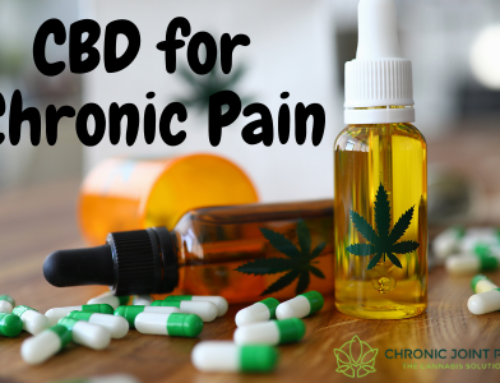Do you feel a sharp sensation in your joints when you try to move or lift something? Is it followed by redness and fatigue? Well, all these are signs of chronic joint pain. Millions of people across the United States are affected by chronic joint pain every year. Age or lifestyle, the reasons can be different for different people.
Due to the common nature of this medical condition, you can find various treatments that can help manage it. There’s self-care, exercise, and medical treatments.
For today’s discussion, we will be focusing on two chronic joint pain treatment options- Opioids and CBD. We’ll dive into the pros and cons of each to help you decide which one is the most suitable option for you.
What Causes Chronic Joint Pain?
Chronic joint pain is not caused by one specific reason. The causes can be as vast as the number of people suffering from it. If not a million, you can definitely pinpoint more than a dozen. Let’s go through a few of them:
- Arthritis
- Fibromyalgia
- Injury
- Inflammation
- Overuse of the joints
- Old age
- Gout
- Infectious diseases
- Lupus
- Rickets
- Cancer
Now, all these causes at merge at one point and leave us with three primary aspects associated with chronic joint pain:
- Inflammation
- Stiffness
- Pain
Most of the pain medications and treatments focus on relieving one or all three of these aspects. Opioids and CBD are no different. Let’s discuss more about the role of these two treatment options for chronic joint pain.
Opioids for Chronic Joint Pain
Opiods are the last resort for people suffering from acute or chronic pain. No doctor will prescribe opioids unless the patient has tried every other option available. Non- steroidal anti-inflammatory drugs or NSAIDs, self-care, exercise therapy, etc. are some of the first options for pain relief. Once everything else fails to be helpful, opioids come into the picture. Hydrocodone (Vicodin) and Oxycodone (Percocet) are some of the commonly prescribed opioids.
Opioids are highly potent analgesics that are used by people suffering from severe chronic pain and medical conditions like osteoarthritis, major trauma, injury, surgery, etc.
Pros
Opioids are highly effective in reducing the sensation of pain and alleviating the discomfort caused by it. These drugs target pain. They enter your body and attach themselves to opioid receptors that are mainly present in the brain, spinal cord, and gut.
As soon as opioids connect with the receptors, pain messages from the body to the brain are blocked. When the brain fails to read any signals of pain, you stop feeling it too. So, it completely alters your perception of pain. Its strong effects is the reason why it’s only used for severe cases.
Cons
There’s a reason why opioids are a last resort for people suffering from pain. Yes, they are potent but opioids carry a high risk of abuse and dependence.
At the moment, the United States is suffering from an opioid crisis. Opioid use disorder has claimed as many as 10.1 million lives which is the reason why it was declared a public health emergency back in 2017. But why is opioid a pain medication and the cause of an epidemic at the same time?
Opioids are potent drugs. When they react with the opioid receptors, they not only eliminate pain sensation but also release feel-good hormones like endorphins. With regular use, your body starts getting used to the change which creates dependence or addiction. So, when the dose wears off, you start craving those feelings and therefore consume more than you should.
At the same time, opioids develop tolerance in the body. Long-term opioid use increases your body’s endurance to the drug and creates the need to increase the amount for effective results.
Opioids are also accompanied by a long list of side effects. It can cause fatigue, confusion, sleepiness, difficulty in breathing, heart problems, gastrointestinal problems, nausea, and more. Additionally, regular use of opioids can help deal with pain, but it does nothing in terms of improving the symptoms or the medical condition.
All these factors make opioid a drug that must be used under high supervision by a professional only. They will create a proper dosage chart that will help the patient to get used to the drug and slowly wean off too.
CBD for Chronic Joint Pain
Cannabidiol or CBD garnered immense recognition as an effective pain treatment. It offers a natural alternative to possibly risky drugs like opioids. Most people associate CBD with cannabis but hemp-derived CBD is legal across the country and also at the federal level due to the Farm Bill 2018.

Cannabidiol in Chronic Joint Pain
CBD does not cause any risk to public safety which allows people suffering from pain to access it easily and without a prescription. But, it’s always best to consult a doctor or a professional before trying CBD for chronic joint pain.
Pros
CBD is a natural remedy. It’s derived from hemp using the cleanest extraction processes to keep its therapeutic properties intact. Unlike opioids, CBD has no risk of abuse or addiction. It does not develop tolerance in the body so it’s ideal for daily use.
CBD works in the body by directly or indirectly affecting body receptors such as the CB, GABA, TRPV1, 5HT receptors, and more. It targets pain by changing certain body functions like the absorption rate of anandamide and serotonin which affects your perception of pain.
CBD also relieves pain by targeting inflammation and stiffness. It has anti-inflammatory properties that reduce active inflammation. You can also count on CBD to relax any stiffness or discomfort in your body and achieve a feeling of overall relaxation.
Apart from the physical aspect, CBD interacts with your brain and reduces stress and tension to develop a sense of calm that further helps sleep better.
On a totally different note, CBD also gives you the freedom of choice. Instead of the same old pills, you can use CBD in innovative forms such as gummies, chocolates, tinctures, and CBD topicals for pain.
Cons
There’s two sides to every coin. So, while CBD is natural and therapeutic, it can cause some side effects too. The intensity of the effects can vary from mild to severe based on factors like additional medications, individual factors, product quality, etc.
Here are some side effects of CBD that you may experience:
- Dry mouth
- Fatigue
- Diarrhea
- Reduced appetite
- Drowsiness
- Interaction with other medications
CBD is legal but not FDA regulated which leaves the responsibility on the consumer to be aware of the quality of the CBD oil they use. You must do your research, read labels and check the certificate of analysis to find the best CBD product.
What’s Your Pick?
Now that you are introduced to the pros and cons of opioids and CBD, which one do you think will be the best option for you? There’s no hurry. Take your time and explore more information at Chronicjointpain.com to find your match.
It’s not easy to live with pain every day. Stop the struggle today and manage chronic joint pain better. Read more, research and discover the best options for yourself.




